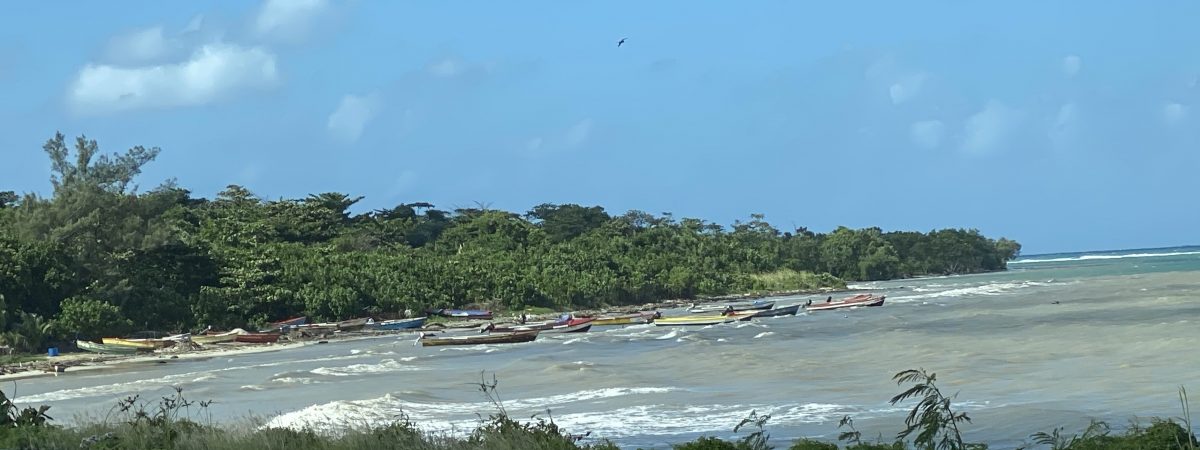A few weeks ago, I wrote about the seemingly seedy and decaying side of Jamaica’s tourism. This week, I found one of those places that can lift the spirit by offering nothing much to visitors other than what nature provides. I discovered Robin’s Bay, St. Mary, in particular, Strawberry Fields Together!

On Jamaica’s north coast, and only about 50 kilometers from the outskirts of Kingston, you’re in a relatively unspoilt rural setting that does not suggest that sea and sand are nearby. Passing through lush, rolling hills from Stony Hill toward Junction Halt, you could easily meander for miles without much concern about where you’ll end up. You reach an area where banana plantations and coconut groves sprout. When you reach the bay area, you see rugged, rocky coast line and rough sea. Very little to attract in terms of amenities. Perfect!

I took some American visitors to Strawberry Fields Together and they loved just being able to get to the sea so quickly. Ocho Rios had seemed like a reasonable option. I then brought my 10-year-old and her friend for the day, while their school was closed. As I write, the little ones are on the beach making sand castles and playing, after having a good hour and more in the sea. We’d called ahead for breakfast and were given a plate of fresh fruit to start. The kids were offered eggs, bacon and coconut pancakes. Big people got cornmeal porridge, ackee and salt fish, and fried dumplings (gourmet-style, made into bows :-)). All of that washed down with mint tea and orange juice.
The kids some went off to hunt some puppies they had seen near the eating area. Then, they went with me to explore the little vegetable gardens that were nearby, with pumpkin, sweet potato, Irish potatoes, okra, tomatoes, and aloe growing. Fifth graders are into potty activity: “Look! They have poo growing.” Their eyes fixed on the lumps of horse manure that were in the plots.
We soon ventured down to the cove and the sea. I showed the girls the hermit crabs and they tried to find some that they could keep as pets. We looked at coral on the sand. We tiptoed over the rocks and out onto some sandy, flat area. Large waves rolled in and seemed ready to cover us, but were all breaking well before they reached us. We loved the only sound we heard–the waves crashing on the rocks. The girls played and sang and were buffeted by the sea. I bathed and thought. Jamaica has a tourism product that is very special, with its unspoiled landscape, in this case, by the coast. It would have been my preference to see the country develop along the lines of the niche of small resorts, but alas, big hotels and activities bring in many more people and much more foreign exchange.
After my bath, I walked up to the headland over the bay and looked down. I got into conversation with another family, who so happened to have children at my daughter’s school. They were about to head off and go further along the coast and into Portland. They had been loving the quiet time they spent. Their 12-year-old daughter, colored hair over one eye, munched on a sumptous-looking pizza. “I want that!” I said to myself.
Lunch was going to be lion fish, steamed with Irish potatoes and garden vegetables, with steamed balmy. The little café has a brick oven and bakes a mean pizza. The girls wanted pepperoni; I tried vegetarian–ackee, pineapple, green peppers, onions, cheese. Verdict: really very good. The pizzas were huge and each would feed easily three people.

I was struck with the food, all prepared to order, where the cooks tried to use local ingredients, but also to use whole grains (such as whole wheat flour for dumplings, pancakes and pizza). A good move ahead would be for the café to start to source vegetables from their own land–ideal, if difficult.
A young man, tending the gardens and “making the place look pretty after the storms” saw me writing and said “You seem like a professor…” I explained that I was just enjoying the peace and quiet.
As noon approached, some other visitors arrived, looking ready to relax for the weekend. The place seemed to get ‘full’ in a short space of time, as our group of four was soon joined by about six more people. Negotiations were going on about meals, for which I was glad that we had settled all that earlier. Everyone looked set to just chill. One couple were poised comfortably on a porch just by the brick oven, and were talking to the office staff. The other group had moved from lounging on the lawn to lounging in the pounding waves. Seemed like a good routine.
The girls were ready to go after their lunch and we were happy to set off at about 2.30pm, having arrived at about 9am. It was a blessing that the trip only takes about an hour.
We left behind the almond and Cacarina trees and began our roll back to Kingston. Tired little people were soon quiet in the back of the car.








